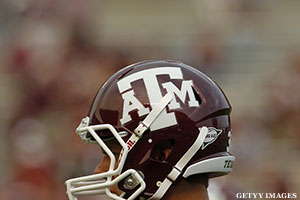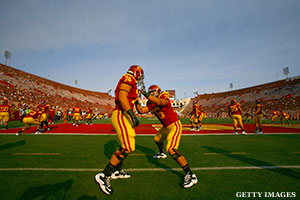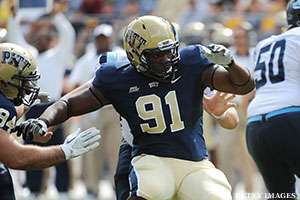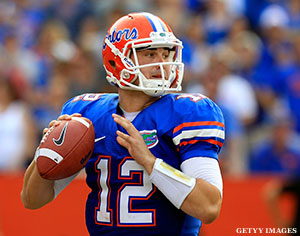In all the confusion and chaos of college football realignment, one thing is clear:
Nobody cares about the players.

How exactly does realignment enrich the student-athlete experience? How does it help if parents can't travel to games as much, if kids at schools like Texas A&M, Nebraska and Pitt can't play in rivalries against friends they grew up with, if there are more also-rans yet still more games in which players can get hurt?
Nobody thinks about these things because nobody has to. The players will go along with it. And if the players suffer, well they had it coming anyway because they're being "paid" a scholarship and they get to be on television and, the argument goes, they're probably selling memorabilia or getting yacht trips.
Maybe that line of reasoning worked in the past, but not in the era of bazillion dollar television networks, concussion-related dementia, and 9.1 percent national unemployment.
Even the NCAA knows it. "Moving young men and women around in the middle of the week or over extended weekends, over those kinds of distances, is pretty hard to square with support for the academic success of students," NCAA president Mark Emmert told USA Today.
It's fine if major conferences make business decisions, but if education is going to be ranked lower (or not at all) on the priority list of those in power, players should get employee rights instead of just students' rights.
In other words: players should get the right to organize.
Yes, the students signed up to play big-time college football, and their scholarships are certainly generous compensation. But a scholarship shouldn’t be hush money. Players are bringing in major income for universities and conferences, and they deserve a voice when major changes are proposed. That means a college football players union.

"There's a significant problem when there’s not a voice," says Duke law professor Paul Haagen. "If the players have no voice, then you’re currently running on an enlightened despotism model. We haven't liked that since the 18th century."
Granted, a player's union would be a radical shift in college athletics. It would open up a Pandora's box of challenges, including possible taxation on scholarships, per diems and even training table meals. But the current system, wherein players are disenfranchised on matters that involve them, is somewhere between unfortunate and un-American.
How many college football players want superconferences? How many want a playoff? How many want weeknight games? We have no clue, and with the rash of Twitter bans at schools like South Carolina, Kansas and Boise State, we’ll never have a clue if something drastic isn't done. Even stars who bring about a boatload of jersey sales are often kept from speaking to the media and encouraged to say very little -- or else.
And that's really the crux of the problem. The coaches aren't really mentors as much as they are bosses. They can pull scholarships on a whim. That puts them in charge of compensation. But in return, the players get no "rights" of their own. It’s take it or leave it. Get in line or get lost. That makes for good football, but it also makes for unfair pressure.
Although they will never admit it, college presidents are rendered largely powerless against the almighty head coach. If the players have a seat at the table -- or at least a team representative with a seat at the table -- presidents could better gauge the interests of the athletes. So could the press. And so could fans, who often have no idea something is amiss on their favorite team until it's far too late.

If practices are so intense that players are at risk of passing out or worse, how will we know? If players with dizziness or vomiting are told to suck it up and go back into the game, how will we know? If a university representative if doing something untoward or even illegal, how will we know?
We won't, because nobody on the team is empowered to speak up. And those who do could lose their dream for a college diploma.
Even Olympians have a representative to their national governing bodies. So why can’t college football players stand up for themselves?
The knee-jerk solution we always hear is, "Pay the players!" But that's just an empty argument. Universities across the country are having serious financial issues and aren't about to start budgeting hundreds of thousands of dollars each year for student-athletes.
Player treatment won't get better with pay, anyway. It might actually get worse, because there will be resentment coming from everywhere. If Florida quarterback John Brantley gets paid $100,000 per season, and he throws 15 interceptions in his first five games, how many fans will feel they are literally being robbed? That's not in the players' interests.
But a union would be.
Just because college players aren't paid doesn't mean they don't deserve the right to organize. In fact, because they aren’t paid, they deserve it more. We saw all summer how important player solidarity was in the NFL lockout. Sure there were varied opinions within the ranks. But players did have a voice and the media (and therefore fans) got a sense of how they felt. We're nowhere near that point with college players. If each senior captain was automatically empowered to speak with the university president and the press on player-related matters, at least we’d know more about the student-athlete experience.

Teaching assistants can organize. Lab techs can organize. They are considered employees of the state, at least in the case of public universities. They have looked at the long hours they've spent helping to make other people money and they’ve come together to fight for protection. In some places, like Yale and Michigan, they've gotten it.
Now, some may scoff at the comparison. It's not like seedy boosters are handing lab assistants suitcases full of cash. But think about it: Researchers are helping to develop cutting-edge software and cures for diseases. The money that can be made off those projects makes Miami booster Nevin Shapiro seem small-time.
"If you look elsewhere in the university," says former Michigan president James Duderstadt, "we do have student-employees, and we pay them education and salary. They are defined as employees. They have the right to unionize. With football players, the value generated is not showed in how we support them. We don't even treat them as well as other students."
That's for sure. A study done in 2009 by Ithaca College and the National College Players Association -- the closest thing to a union currently -- found that "full-ride" scholarships still leave players with an almost $3,000 shortfall. It would be nice if players could negotiate for that amount -- especially considering the extra travel they will be taking as part of a superconference realignment will be making far more than that for their schools.
This isn't a way to clean up the game. That will never happen. Getting kids to stop taking money and freebies is about as impossible as cleaning up Wall Street or stopping politicians from having affairs. If someone is offering you something with no apparent strings attached, not many can say no. That won’t change even if players are paid, because there will always be boosters around to pay more. Keep in mind that even though Yahoo! Sports reported Miami players were getting mind-boggling perks, the program still lost many of the best recruits over the past decade to other schools. What does that tell you?
So banish the thought of the end of shamateurism. Even an NCAA as powerful as the 1980s Kremlin won't eliminate greed. Instead, let's go after a far more important benefit to organizing: long-term health. NFL players saved themselves untold injury and trauma by keeping the season at 16 games. They are able to fight for health benefits and post-career care. What about college players? Their concussions and injuries are just as severe -- just look at Rutgers defensive end Eric LeGrand -- and yet there are no assurances that anyone at the university will help them if they suffer from concussion-related dementia or mental illness.
We always hear from university presidents. We always hear from coaches. We always hear from media pundits. But we rarely if ever hear from players. It's time for that to change.
"College football's as great as it's ever been," Texas coach Mack Brown said Monday on the Big 12 conference call, "but we better keep considering what's in the best interest of the players or at some point they're going to get so frustrated it won't be fun for them."




